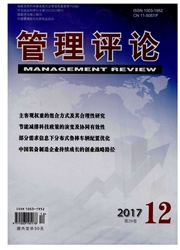

 中文摘要:
中文摘要:
为解决异步跨时区知识流动过程中的知识共享有效性问题,研究在企业资源理论和协同管理理论基础上,结合24小时知识工厂(24Hr KF)思想及其全球分布式团队典型特征,在跨时区协作研究过程中对知识共享有效性产生影响的关键因素进行总结归纳,在24Hr KF基础上建立了知识共享有效性影响因素理论模型,并通过227份跨国企业和承接海外外包的项目团队成员调查数据进行验证。结果发现:(1)知识异质性、信任和信息与沟通技术使用程度对知识共享有效性有显著正向影响,跨时区时间极差对知识共享有效性有显著负向影响;(2)信息与沟通技术使用程度还分别对知识异质性、信任、跨时区时间极差和知识共享有效性之间的关系存在显著调节作用。
 英文摘要:
英文摘要:
In order to solve the problem of the asynchronously across time zones in the process of knowledge sharing effectiveness,we combine 24-hour knowledge factory thought with typical characteristics of distributed teams based on Enterprise Resource Theory and Collaborative Management Theory,sum up the key factors of knowledge sharing in global operations asynchronously across time zones,build the Knowledge sharing effectiveness factors theory model,and use 227 pieces of data of empirical investigation and undertake overseas outsourcing multinational project team members to verify hypothesis,the results show that:( 1) The heterogeneity of knowledge,trust and the extent of the use of information and communication technologies have a significant positive impact on the effectiveness of knowledge sharing,the degree of separation working hours across time zones have a significant negative impact on the effectiveness of knowledge sharing;( 2) The application of information and communication technology has a significant positive regulatory role to the knowledge heterogeneity,the degree of separation of work time and knowledge sharing effectiveness.
 同期刊论文项目
同期刊论文项目
 同项目期刊论文
同项目期刊论文
 期刊信息
期刊信息
